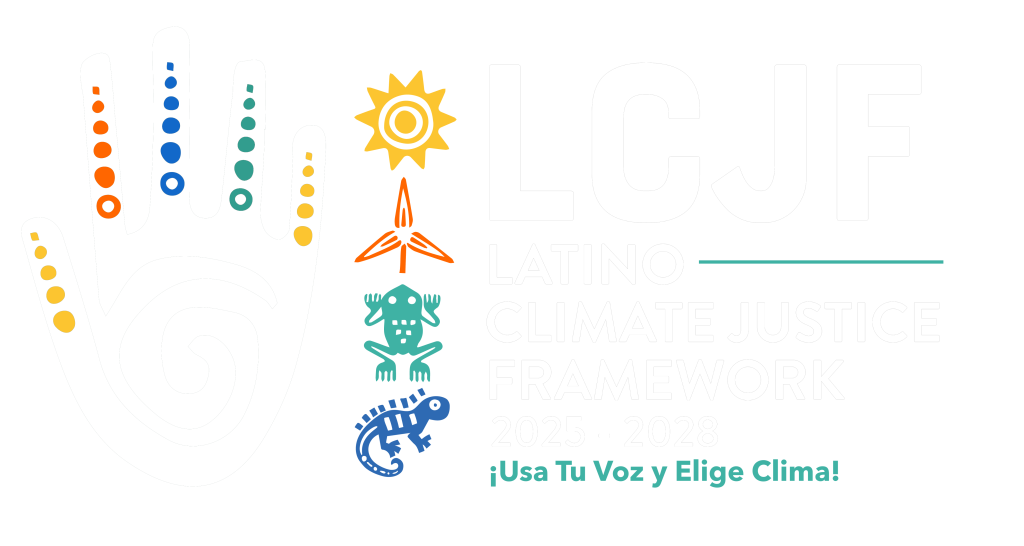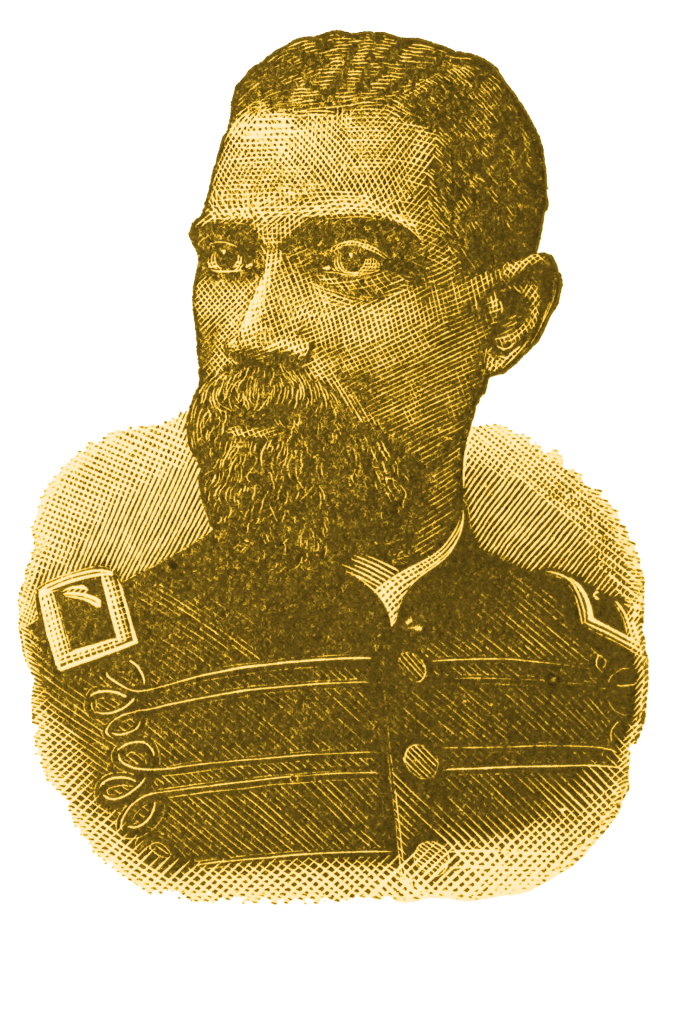Vision
2025-2028
The 2025-2028 update enhances the framework with new components like case studies, policy trackers, and additional critical topics, such as plastics, critical materials extraction, disinformation, false solutions, and non-farming outdoor labor. It introduces new sections on mining, battery recycling, and false climate solutions while expanding coverage of urban greening, worker protections, and climate migration; it addresses Spanish climate disinformation, rewrites the Puerto Rico section, and adds case studies on community solar, clean water access, and local fossil fuel bans.

The Latino Climate Justice Framework (LCJF) 2025-2028 update reflects our commitment to addressing the evolving landscape of climate issues affecting Latino/a/e communities. The LCJF 2025-2028 will continue to be a catalyst for change, empowering nuestra comunidad to be the driving force behind climate solutions and a thriving future rather than resigned victims. This framework represents our collective voice and our commitment to securing environmental liberation for all.

About The Report
Latino Climate Justice Framework
2025-2028
The work of a broad coalition of Latino/a/e organizations, the LCJF is a comprehensive framework for addressing the climate crisis and serving the needs of Latino/a/e communities across the country. This framework provides a blueprint for our partners to advocate on behalf of our communities.
Chapters
01

Energy Justice
Latino/a/e communities are leading the charge for true energy justice. We reject false solutions and demand real action that addresses the root causes of climate change. By championing community-owned renewables, clean transportation, and toxic site remediation, we’re creating a future where our communities thrive and lead in green innovation.
Chapters
02

Bearing the Burden
Climate change hits our communities first and hardest, but we are resilient problem-solvers. We call for climate-resilient infrastructure, worker protections, and recognition of climate refugees. Our approach transforms climate challenges into opportunities for community empowerment and societal change.
Chapters
03

OUR Land and Water
We’re reclaiming our connection to land and water, from urban green spaces to public lands. We demand equitable access to nature, environmental decision-making representation, and green economy leadership. By blending traditional knowledge with innovative solutions, we’re writing a new chapter in environmental justice that honors our heritage and secures our future.

01
Energy Justice
- Communities at the forefront: leading the path to change
- Transit Justice
- Reducing fossil fuel pollution/ plugging and remediating abandoned oil wells
- Avoiding the false solutions trap
Background
Sunset Park Solar is Sunset Park’s first community-owned solar initiative, aiming to deploy solar panels on local rooftops for grassroots control of renewable energy in the neighborhood. The first project is a 725-kilowatt solar array on the Brooklyn Army Terminal rooftop that will serve 150-200 households with 20% electricity bill savings.The project will be owned and operated by a partnership between UPROSE, Brooklyn’s oldest Latino community-based organization, located in Sunset Park, and its development partner Working Power.

Challenges
Sunset Park Solar tackles the challenge of high electricity costs that harm residents’ finances, public health, and the environment. The initiative aims to replace polluting power plants with renewable energy, fostering local workforce development and community wealth. However, in densely populated Brooklyn, many residents and businesses lack property ownership, limiting their ability to install solar power. Key challenges include securing site control and building relationships with public and private site owners, many of whom are unfamiliar with the benefits of community-owned solar. Additionally, funding remains a hurdle, as grassroots projects often struggle to access affordable, non-extractive capital.

Solutions
The project will allow residents to benefit from solar energy without needing to own property or install panels themselves. Sunset Park Solar also trained six Sunset Park residents in solar installation. The project’s co-ownership by UPROSE will direct electricity revenues to a Community Dividend Investment Fund for investment in just transition infrastructure projects to be decided by community members.

Blueprint for Community Solar
Recognize the needs and priorities identified by communities themselves (rather than by external residents or organizations), which could include a community-identified need for community owned solar. Establish a partnership with tested and trusted impact community solar developers. Map out potential sites for a community solar array and discuss with site owners. Develop a plan for engaging residents, training workers, and using the revenues generated from the array for community needs. Recruit residents to be subscribers through multilingual, accessible education and new and existing outreach. Train local workers, and build the project.


02
Bearing the Burden
- Building Climate-Resilient Communities
- Providing Equitable Access to Clean, Healthy, and Affordable Water
- Protections For All Workers
- Climate Displacement and Migration
Background
Allensworth is a community in California that was founded in 1908 by distinguished Black military men and academics, including the formerly enslaved Col. Allen Allensworth, to be a self-sustaining Black community focused on education. Known as the “Tuskegee of the West,” the community initially flourished, even establishing Tulare County’s first public library.

Challenges
After Col. Allensworth’s murder and the denial of promised water rights, many Black residents left. Water security has been a persistent issue since Tulare Lake was drained for agriculture and corporate agribusiness began exploiting California’s Central Valley’s aquifer. These activities degraded the landscape, resulting in water insecurity, soil pollution, and the worst air quality in the United States, all now worsened by climate change. Racism and invisible redlining continue to confine rural communities of color to the most polluted areas in the valley.

Solutions
The Allensworth Progressive Association (APA), the community’s development nonprofit, continues Col. Allensworth’s legacy. APA is creating a model for self-reliant, innovative, and climate-resilient communities of color. Through regenerative agriculture, SmartAg, mutual benefit principles, workforce development, education, a resiliency center and a solidarity economy, Allensworth is building a sustainable future for itself and other rural communities of color in Central Valley.

Blueprint for Community Solar
What makes Allensworth stand out is their adaptability and multi-faceted approach to ensuring long-term resiliency that others should be using as guiding principles. This includes establishing similar models that APA is working on as mentioned in the solutions section and advocating for institutional changes at various governmental levels. Additionally, implementing climate-resilient infrastructure, developing tailored water management strategies, and fostering knowledge-sharing platforms among rural communities of color are crucial steps towards building sustainable and resilient communities in the Central Valley.


03
OUR Land & Water
- Stewardship Of The Natural World and Heritage Sites
- A Fairer Playing Field
- Removing Barriers To Immigration and Citizenship
- Energy Justice For Puerto Rico
Our Inaugural Partners
The Latino Climate Justice Framework is an evolving document. We are committed to updating it periodically. Check out our original 2022 report here.
GreenLatinos is proud to be in comunidad with the following
coalitions, leaders & networks








Adigrat University, Ethiopia, Tigray
Arte Sana
Atlantic Climate Justice Alliance
BRAAVE Tribe Collab
Californians Against Waste
Casa Ruth
Center for Biological Diversity
Center for Progressive Reform
Ceres
Change the Chamber Lobby for Climate
Climate Action Campaign
Climate Reality
Community Water Center
Conservation Colorado
CREO
Earthjustice
EcoLatinos, Inc.
ecomystica, LLC
Environmental Defense Fund
Farmworker Justice
Friends of the Earth
Friends of the Inyo
Fruition Sustainability Solutions LLC
Grand Staircase Escalante Partners
GreenLatinos
HECHO
Klamath Siskiyou Wildlands Center
Latino Network
Latino Outdoors
Latino Verde Inc.
Los Padres ForestWatch
Make the Road NV
MEG Engineers Group
Moms Clean Air Force
Mothers Out Front
Mukuyu Collective
Mystic Aquarium
National Audubon Society
Nature for All
North American Climate, Conservation and Environment (NACCE)
Oregon Wild
Plastic Pollution Coalition
Progressive Reform
Protegete
Queer Brown Vegan
Rise South City
Rozalado Services
Sachamama
Save the Sound
SierraForever
Sierra Club
Sky Island Alliance
Southern Utah Wilderness Alliance
Stanford Health Care
Surfrider Foundation
The Community Library
The Idaho Organization of Resource Councils
The Nature Conservancy
The Water Hub Project
Union of Concerned Scientists
Unite North Metro Denver
University of Denver Interdisciplinary Research Institute for the Study of [in]Equality (IRISE)
Voluntario Independiente
Washington Farmland Trust
Watershed Progressive
Wisconsin EcoLatinos
Yale Center for Environmental Justice
Zero Waste Project


























